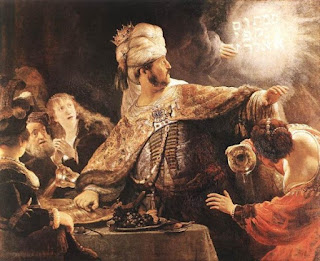The Book of Daniel was not a Forgery
What comes to mind when the prophet Daniel is mentioned? Perhaps some of the accounts many of us learned as children, such as his account of his friends in the fiery furnace, eating veggies, or his own experience in the den of lions. How about Belshazzar's blasphemous feast on his last night as a ruler, which prompted the expression, "The writing on the wall?" Then there are those prophecies...
The Bible has come under attack for centuries for various reasons, especially its historical reliability. Materialists act from their presuppositions that there is no God and are no miracles. There can be no prophesy, nosiree! The book of Daniel is rejected by them and liberal "Christian scholars" for similar reasons.
 |
| Belshazzar's Feast, Rembrandt Harmenszoon van Rijn, 1635 |
A simple way to reject the contents of Daniel's book is to find excuses to deny its authenticity. Some claim that it was a forgery written much later, but that dog won't hunt. Using the fallacious argument from silence: Since archaeology hasn't verified something from so long ago, it must not have happened. That's downright foolish since the Bible is repeatedly shown to be historically valid. There are many reasons to accept its authenticity.
It is important to note that secularists reject Daniel for the same reason that they reject Genesis—they are materialists. Just like they do not believe in the supernatural creation of the world in 6 days around 6,000 years ago, they do not believe that someone could be given actual knowledge about future events by the Creator. In this way, Daniel’s prophecies are as powerful a message to us today as they were to Nebuchadnezzar.
To read the entire article, visit "Daniel: Prophecy or Pseudonymous Forgery?"